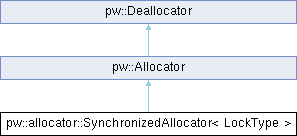template<typename LockType>
class pw::allocator::SynchronizedAllocator< LockType >
Wraps an Allocator with a lock to synchronize access.
Depending on the LockType, this object may be thread- and/or interrupt- safe. For example, SynchronizedAllocator<pw::sync::Mutex> is thread-safe, while SynchronizedAllocator<pw::sync::InterruptSpinLock> is thread- and interrupt-safe.
- Template Parameters
-
| LockType | The type of the lock used to synchronize allocator access. Must be default-constructible. |
|
|
| SynchronizedAllocator (Allocator &allocator) noexcept |
| |
| Pointer | Borrow () const |
| |
| void * | Allocate (Layout layout) |
| |
| template<typename T , int &... kExplicitGuard, typename... Args> |
| std::enable_if_t<!std::is_array_v< T >, T * > | New (Args &&... args) |
| |
| template<typename T , int &... kExplicitGuard, typename ElementType = std::remove_extent_t<T>, std::enable_if_t< is_bounded_array_v< T >, int > = 0> |
| ElementType * | New () |
| |
| template<typename T , int &... kExplicitGuard, typename ElementType = std::remove_extent_t<T>, std::enable_if_t< is_unbounded_array_v< T >, int > = 0> |
| ElementType * | New (size_t count) |
| |
| template<typename T , int &... kExplicitGuard, typename ElementType = std::remove_extent_t<T>, std::enable_if_t< is_unbounded_array_v< T >, int > = 0> |
| ElementType * | New (size_t count, size_t alignment) |
| | Constructs an alignment-byte aligned array of count objects.
|
| |
| template<typename T > |
| T * | NewArray (size_t count) |
| |
| template<typename T > |
| T * | NewArray (size_t count, size_t alignment) |
| |
| template<typename T , int &... kExplicitGuard, std::enable_if_t<!std::is_array_v< T >, int > = 0, typename... Args> |
| UniquePtr< T > | MakeUnique (Args &&... args) |
| |
| template<typename T , int &... kExplicitGuard, std::enable_if_t< is_unbounded_array_v< T >, int > = 0> |
| UniquePtr< T > | MakeUnique (size_t size) |
| |
| template<typename T , int &... kExplicitGuard, std::enable_if_t< is_unbounded_array_v< T >, int > = 0> |
| UniquePtr< T > | MakeUnique (size_t size, size_t alignment) |
| |
| template<typename T , int &... kExplicitGuard, std::enable_if_t< is_bounded_array_v< T >, int > = 0> |
| UniquePtr< T > | MakeUnique () |
| |
| template<typename T > |
| UniquePtr< T[]> | MakeUniqueArray (size_t size) |
| |
| template<typename T > |
| UniquePtr< T[]> | MakeUniqueArray (size_t size, size_t alignment) |
| |
| template<typename T , int &... kExplicitGuard, std::enable_if_t<!std::is_array_v< T >, int > = 0, typename... Args> |
| SharedPtr< T > | MakeShared (Args &&... args) |
| |
| template<typename T , int &... kExplicitGuard, std::enable_if_t< is_unbounded_array_v< T >, int > = 0> |
| SharedPtr< T > | MakeShared (size_t size) |
| |
| template<typename T , int &... kExplicitGuard, std::enable_if_t< is_unbounded_array_v< T >, int > = 0> |
| SharedPtr< T > | MakeShared (size_t size, size_t alignment) |
| |
| template<typename T , int &... kExplicitGuard, std::enable_if_t< is_bounded_array_v< T >, int > = 0> |
| SharedPtr< T > | MakeShared () |
| |
| bool | Resize (void *ptr, size_t new_size) |
| |
| bool | Resize (void *ptr, Layout layout, size_t new_size) |
| |
| void * | Reallocate (void *ptr, Layout new_layout) |
| |
| void * | Reallocate (void *ptr, Layout old_layout, size_t new_size) |
| |
| size_t | GetAllocated () const |
| |
|
constexpr const Capabilities & | capabilities () const |
| |
|
bool | HasCapability (Capability capability) const |
| | Returns whether a given capability is enabled for this object.
|
| |
| void | Deallocate (void *ptr) |
| |
| void | Deallocate (void *ptr, Layout layout) |
| |
| template<typename ElementType > |
| void | DeleteArray (ElementType *ptr, size_t count) |
| |
| StatusWithSize | GetCapacity () const |
| |
| bool | IsEqual (const Deallocator &other) const |
| |
| template<typename T , int &... kExplicitGuard, std::enable_if_t<!std::is_array_v< T >, int > = 0> |
| void | Delete (T *ptr) |
| |
|
template<typename T , int &... kExplicitGuard, typename ElementType = std::remove_extent_t<T>, std::enable_if_t< is_bounded_array_v< T >, int > = 0> |
| void | Delete (ElementType *ptr) |
| |
|
template<typename T , int &... kExplicitGuard, typename ElementType = std::remove_extent_t<T>, std::enable_if_t< is_unbounded_array_v< T >, int > = 0> |
| void | Delete (ElementType *ptr, size_t count) |
| |

 Public Member Functions inherited from pw::Allocator
Public Member Functions inherited from pw::Allocator Public Member Functions inherited from pw::Deallocator
Public Member Functions inherited from pw::Deallocator Public Types inherited from pw::Deallocator
Public Types inherited from pw::Deallocator Protected Member Functions inherited from pw::Allocator
Protected Member Functions inherited from pw::Allocator Protected Member Functions inherited from pw::Deallocator
Protected Member Functions inherited from pw::Deallocator Static Protected Attributes inherited from pw::Deallocator
Static Protected Attributes inherited from pw::Deallocator